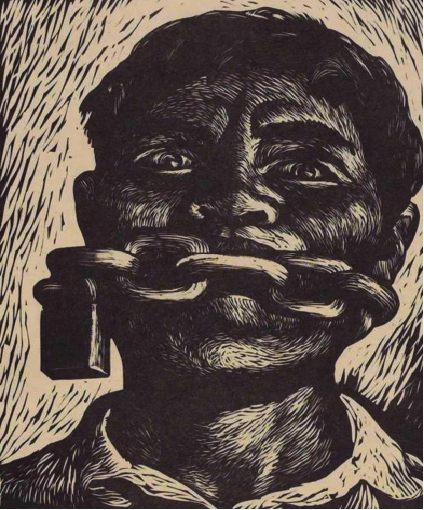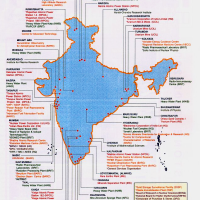On April 16, 2006, Khandwa in Madhya Pradesh was tense. There had been communal clashes a week ago during Eid-e-Milad. In the afternoon, policemen from the Kotwali police station arrested two women, 20-year-old Aasiya and 23-year-old Rafia, daughters of one Abdul Hafiz Qureshi. The police, in their seizure memo, claimed to have recovered “incriminating material” from Aasiya — three copies of an April 2004 issue of a Hindi magazine, Tehrik-e-Millat, and a SIMI donation receipt towards “office construction fund” (receipt no. 0033359, dated January 25, 2006) with the name “Kumari Aashiya Khan” in Hindi for an amount of Rs 500.
SIMI was banned in 2001. If an underground outfit issuing a donation receipt for a building on their old stationery seems unlikely, the story of the magazine is even more odd.
All the three copies of Tehrik-e-Millat allegedly recovered from Aasiya have her name written by hand in Hindi as “Aashiya” on the cover. The police also claimed to have seized two copies of Tehrik-e-Millat with “Rafia” written by hand in Hindi on the cover. Tehrik-e-Millat is a fortnightly published from Kota in Rajasthan. Though the Kotwali police station in Khandwa later booked the magazine’s owner-editor M A Naiem, the magazine has never been proscribed.
This is not all. In the space of two years, these same copies of the April 2004 issue of Tehrik-e-Millat — with the names of the Khandwa sisters written by hand on the cover — travelled to at least two other states. Several cases later, the police even started referring to the magazine as “Tehrik Millat Aasiya” and “Tehrik Rafia” in their official records. However, other than their names on the magazines, the two sisters were never mentioned in police records.
July 2006, Pune
After the July 11, 2006, bomb explosions on local trains in Mumbai, the magazine popped up in the chargesheet filed by the Anti-Terrorism Squad, Mumbai. Among the 13 people arrested was Sohail Mehmood Shaikh of Bhimpura, Lashkar, Camp Area Pune, who was held on July 25, 2006. The ATS claimed Sohail went to Pakistan via Iran in November 2002 for arms training with the Lashkar-e-Toiba. They also said a search of Sohail’s house in Bhimpura on July 30, 2006, had led to the recovery of six books including the “April 2004 Tahrik-e-Millat Asia” that had “Aashiya” written by hand on the cover. Police claimed to have recovered the same magazine, with the same handwritten “Aashiya”, during searches at the homes of the other 7/11 accused — Mohd Faisal Ataur Rehman Shaikh of Bandra, Muzzamil Ataur Rehman Shaikh of Mira Road, Jameer Latifur Rehman Shaikh of Vallabhbhai Patel Nagar and Dr Tanvir Ahmad Mohd Ibrahim Ansari of Agripada, all in Mumbai.
July 2006, Mumbai
In an affidavit filed before the UAPA (Unlawful Activities (Prevention) Act) Tribunal in 2010, Assistant Police Inspector, ATS, Mumbai, Rahimatullah Inayat Sayyed, spoke of Danish Riyaz Shaukat Ali Shaikh, an “active member of SIMI”, who was arrested on July 30, 2006. According to the affidavit, a raid on Shaikh’s home led to the recovery of several Islamic books in Urdu such as Jihad Fi Saabi Illah, Jihad Asghar and Jihadi Fishbilliah, besides ‘Tehrik Millat Aasiya’, the same magazine.
August 2006, Mumbai
According to an affidavit filed by Inspector, DCB, CID, Mumbai, Milind Bhikaji Khetle, a case was registered at Kandivali police station on August 13, 2006, against Mohd Najib Abdul Rashid Bakali and some of his “SIMI associates”. The affidavit said that on August 14, 2006, police seized four SIMI booklets from Bakali’s house. One of the alleged ‘SIMI’ booklets was a copy of the April 2004 issue of the Tehrik-e-Millat magazine with “Aashiya” written by hand in Hindi on its cover.
September 2006, Malegaon
On September 8, 2006, powerful blasts ripped through the Bada Kabaristan area of Malegaon after the Shab-e-Barat prayers, killing 37 people and injuring over 100. An FIR was registered at Azad Nagar Police Station, Malegaon, and Noor-ul-Huda Shamsudoha, a labourer, was arrested under the UAPA for being a SIMI member and for “popularising and publicising” SIMI. During a raid on Noor-ul-Huda’s home at Jafarnagar, police claimed to have seized “objectionable books’’ that included the copy of the April 2004 issue of the Tehrik-e-Millat magazine with “Aashiya” written by hand in Hindi on its cover.
On September 19, 2006, the investigation was transferred to ATS, Mumbai. Within days, Noor-ul-Huda became one of the main accused in the Malegaon blast case. Eight more people were later arrested as the ATS, Mumbai, claimed to have solved the case. Noor-ul-Huda and the other accused had already spent six years in jail in Mumbai by the time the case took a new turn following Swami Aseemanand’s confession in January last year. On November 16 last year, Noor-ul-Huda and the other eight were granted bail.
September 2008, Jabalpur, Madhya Pradesh
On September 19, 2008, the MP Police nabbed “SIMI activist” Mohd Ali, 29, of Jabalpur from the Misrod railway station. Police officer T I Chandan Singh Surama recorded in the FIR: “We searched his bag and found papers of SIMI which is an offence.” The Misrod police station claimed that the papers seized from Mohd Ali’s bag included “Tehrik Rafia” — that is how the police’s seizure memo refers to the Tehrik-e-Millat magazine because it had “Rafia” written by hand in Hindi on the cover, the same copy of the same magazine that the Kotwali police station had claimed to have seized on April 16, 2006, from Rafia in Khandwa.
Besides, the police claimed that a SIMI donation receipt towards office construction fund (Receipt No. 0033359) dated January 25, 2006, with the name Kumari Aashiya Khan in Hindi for an amount of Rs 500 was recovered from Mohd Ali. This donation receipt is also exactly the same as the one the Kotwali police had claimed to have recovered from Aasiya in Khandwa. It was on the basis of these two “incriminating” documents alone that Mohd Ali was booked under the UAPA.
Incidentally, in the initial Khandwa case in which Aasiya and Rafia were arrested, the police kept extending the list of accused, going on to arrest 12 youths, including their brother Inam-ur-Rehman. Later, Inam was also picked up after the Jaipur blasts of May 13, 2008, and taken to Rajasthan. All the 14 held in the case were initially accused of being SIMI members.
On December 9, 2011, a fast-track court acquitted 11 of the 14, including Inam.




















